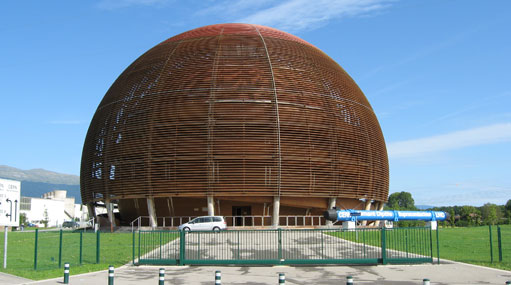
ATLAS e-News
23 February 2011
Media Day: All eyes on the LHC
8 September 2008

The Globe – quiet in this photo, but it will serve as headquarters for 250 visiting journalists on first beam day
The first beam is set to arrive in the LHC just two days from now, starting from 9:30 in the morning, Wednesday, September 10th. The CERN Press Office has been arranging multiple means for journalists to get access to information about our progress getting the first protons around the collider ring.
While much of the action will be at the CERN Control Centre and the Globe, the 250 registered journalists can also request access to the experiment control rooms. ATLAS is expected to welcome many of them through the day. They can talk to physicists in one of the interview corners, visit the ATLAS control room, or go to the offline control room to observe computing work on the Grid.
Since the CCC has the capacity to host only a small number of journalists at any time, the Globe will be equipped with a large screen to give the press there a live look at the goings-on. There is also a console set up, where operators from the LHC and the experiments can demonstrate their work. This feed will also be satellite broadcast by Eurovision.
CERN will provide a webcast as well, but only 2,000 viewers can watch at a time. For those of us lucky enough to be at CERN, we can watch the video from many of the auditoriums, including the main auditorium and the IT auditorium.
The day will open with a briefing at 9:00 a.m., followed by the first beam attempt starting at 9:30. News updates will be given every full hour and a press conference with the Director General and the LHC Project Leader will be held at noon. “The declared aim is to get one beam around, but if all goes well, we may even get both beams through ATLAS,” said Helfried Burckhart, coordinator for the ATLAS angle of the Media Day.
There is another activity running in parallel: from Point 1, CERN will connect to several ATLAS collaborating institutions. In this way, off-site collaboration members and journalists can participate at the event. “It will be a very busy day, starting at 8:00 a.m. with Melbourne, Australia, these meetings are set to traverse the globe, ending with Toronto, Canada, around 9:00 p.m.,” Helfried says. Some groups will give their home teams a technical update on the progress. Others may choose to do panel-style discussions. Journalists in the respective countries are welcome to enter these meetings and ask questions.
